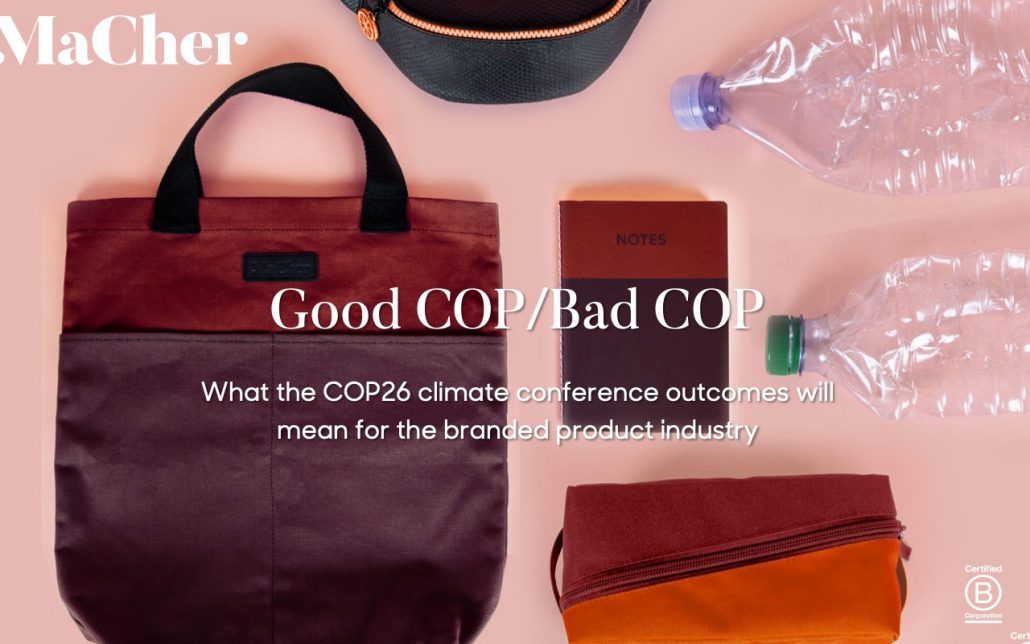The global climate change talks in Glasgow, Scotland have just finished. Governments have come together to agree steps that reduce the negative impact of human behavior on the planet. The branded products industry needs to be on top of this direction of change.
As storms, droughts, floods and fires have become more frequent and intense, consumers have been demanding cleaner and greener products:
- 64% of US adults say they would rather have products made with recycled rather than virgin materials. That figure increases if the material has a story behind it (like ocean plastics) (MaCher/Compose[d])
- 57% of consumers are willing to change their purchasing habits to help reduce their negative environmental impact (IBM)
- 66% of people around the world say they now expect brands to take more responsibility in motivating them to live by their values (Accenture)
Government promises made at COP26 will put pressure on business to change
Future sustainability is not likely to be driven solely by consumer demand. Instead, top-down financial and regulatory agreements made at COP26 will put significant pressure on companies to make what they produce less harmful to the environment.
Landfill prices and corporate taxes will likely increase to meet new promises to cut methane emissions by 30% from 2020 levels by 2030. As landfill accounts for 20% of methane emissions, reducing the amount of waste headed for landfill will be a priority. We may see more opportunities and financial incentives for companies to invest in take-back programs. Finding more circular uses for products also aligns with one of the biggest announcements out of COP26 – to end and reverse deforestation by 2030.
The UK announced that from April 2022, companies with more than 500 employees and £500m ($800m) in annual turnover will have to communicate their climate risks. UK-listed companies will also need to release net-zero plans by 2023. The UK is the first G20 country to take these steps but others are expected to follow. This global shift for compulsory climate reporting will bring far greater measuring and accounting of climate risk in business.
Business promises at COP26 to focus on having zero carbon impact
Outside of government agreements, more than 450 financial companies promised that they would drive trillions of dollars towards projects and investments that have zero carbon impact over the next 30 years. The group that includes Bank of America, Credit Suisse, Morgan Stanley and AXA, has $130 trillion in assets under management.
These companies with huge financial power will likely influence the terms and offers of both bank loans and insurance for businesses and individuals. Loans may be turned down or insurance not granted if requests fail to account for climate impact and action. If they aren’t doing it already, businesses will need to start measuring and accounting for the direct and indirect impacts of their operations in order to get better rates and favourable financing terms.
Changes will force greater sustainability in the branded products industry
The COP26 was a disappointment for many who wanted much stronger climate action. The agreements and promises made do show a clear direction, however. Regulation and financial disincentives over the years ahead will penalize less sustainable products. The costs of doing business that creates negative environmental impacts may become too high.
The branded products industry needs to be on top of this direction of change. Too often, branded products are wasteful and have little use or value to the end user. This has to stop.
MaCher has been helping our clients make fewer and more purposeful gifts for over 30 years. This will continue as our main priority. Over 95% of our products are already reusable and our goal is 100% by 2023. We embed regenerative materials and circular solutions in the way we operate, and we measure the impact of what we make in market.
It is only by making better things, that we can start to make things better.
MaCher – Make Better Things to Make Things Better


